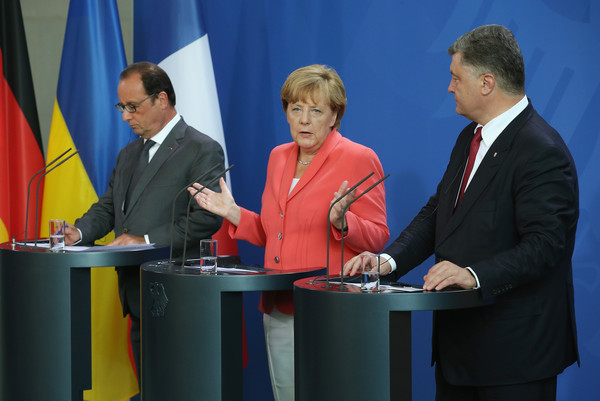KIEV, (APP/AFP) – Germany and France on Tuesday urged Kiev to root out corruption and quickly adopt a law on elections in the pro-Russian separatist east that may help resolve Ukraine’s 22-month war.
“We need for the economic reforms to be pushed forward,” German Foreign Minister Frank-Walter Steinmeier told a joint press conference attended by his French counterpart Jean-Marc Ayrault and Ukraine’s Pavlo Klimkin.
“But it is essential that this policy is based on a principle of zero
tolerance for corruption,” Steinmeier stressed.
He added that “we cannot accept that there are so many violations of the ceasefire and that the electoral law is being postponed” by Ukraine.
Such a law “would be the basis for elections to be organised in the east.”
Berlin and Paris have been spearheading Western efforts to end a revolt against Kiev’s pro-Western leadership that has claimed more than 9,000 lives in the European Union’s backyard.
But a peace plan signed one year ago that was meant to find a permanent solution by the end of 2015 has expired with few of its commitments met.
One of those measures involves Ukraine adopting a law on elections that grants rebel-run regions temporary special status — a step Kiev has refused to take.
And the country itself has been hit by a political crisis in which Prime Minister Arseniy Yatsenyuk survived a no-confidence vote last week that came only hours after President Petro Poroshenko himself urged his government leader to step down.
Opinion polls show Ukrainians increasingly unhappy with the two men’s
perceived inability to fulfil the anti-corruption and reformist agenda that
propelled them to power after the February 2014 ouster of Kiev’s Moscow-backed leadership.
The French foreign minister said the European Union “will continue to
support your country”.
“However, to be clear, we need for (Ukraine’s) policies to be determined, credible and sustainable,” Ayrault said.
He further warned that “the worst scenario for Ukraine would be for it to stay in midstream, with half of the reforms adopted and a situation without prospects” in the war zone.
The diplomats’ visit to Kiev is meant to help pave the way for a March 3 meeting with their Russian and Ukrainian counterparts in Paris devoted to finding a lasting solution to one of Europe’s deadliest conflicts since the 1990s Balkans wars.
The four nations agreed the so-called Minsk II deal in February 2015 and their foreign ministers have been holding periodic talks aimed at resolving issues preventing peace from returning to Ukraine’s industrial east.
International News
Germany, France pressure Ukraine over graft, election law
